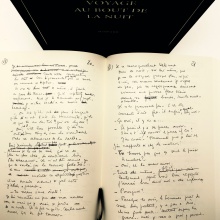This frankly pointless text was inspired by a short, but personally profound remark the French writer Georges Perec made in his book, Espèces d’espaces [1974], about never using the word et cetera. Georges Perec believed that the word et cetera occulted important aspects of everyday life and usage of space. All spaces and people are interconnected in some way, and to leave it out is to voluntarily remain complacent in one’s ignorance.
The French fin-de-siècle writer Guy de Maupassant once quipped that the only reason he enjoyed dining at the Eiffel Tower was precisely because it was the only place in Paris where he would be rid of its sight. I myself have always wondered whether there was a sort of special hiding place from the all-pervading influence of the expression et cetera.
Et cetera: Etymology,characteristics, and the danger of presumption
Derived from the same latin expression, et cetera literally means “and the rest” or “and so forth”. Historically, the word et cetera was used to facilitate a practical way of addressing monarchs whose real titles were probably longer than their respective bloodlines. It is a polite way of saying: “we get it, you’re the boss”. Et cetera‘s primary function is therefore to curtail.
Commonly abbreviated as “etc.”, et cetera is a word to be used with moderation. Three harmless letters with a full stop will probably be the end of you.
The special characteristic of the word is that unlike many overused words, which begin, punctuate or interject your sentence, the word et cetera, or “etc.”, must invariably be used at the end of the sentence. The only problem is that et cetera is not used to end the sentence. On the contrary, its precise function is to curtail and condense elements of lesser importance into one single word. By doing so, et cetera assumes you know roughly what the person is talking about when, in fact, you could be completely off the mark.
A user’s guide to et cetera
Never use the word et cetera unless you are completely sure that your target audience knows exactly about the secondary elements you’re trying to communicate. And then again, why not make the effort to just spell it out? Since et cetera is always the last word of the sentence, it is also the first word your audience will apprehend. Be prepared to answer a slew of questions and respond to points of clarification.
Et cetera and dangers of overdose
Like many overused words in every language in the world, et cetera is at the tip of every person’s tongue and every writer’s pen. It is a neat substitute to keep the talk going when you’re running low on ideas, even when deep down you know the fire is about to burn out. It is a smokescreen made to convince you that there’s burning fire behind that thick misty veil of false presumptions and intentions, when in fact, what you see is actually what you get: smoke. Fire does not run on its own, nor does it run on et cetera. The opposite is true for the rare intelligent user of the language who clings on to each and every word he employs: you know they actually have something to say from the way they make do with what little they have; that solemn pause, a desperate search for le mot juste. Are they ever going to find the word? Perhaps so, perhaps not. Silence is gold. Et cetera is…well…smoke.
The word et cetera is not about to disappear from the surface of the earth. So let’s just learn to live with it. If et cetera denotes an infinite list of corresponding possibilities to the word, statement, or idea in question, then perhaps there is more to what meets the eyes.
Et cetera etc.
Swasdiburi

